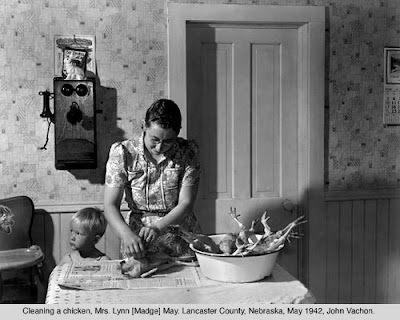It was a warm afternoon in late August and my siblings had just gone back to school when my father, who was driving over to the neighbors, asked if I wanted to ride along. I don't recall our business, probably something to do with cows, horses, or hay, but he was going over to see Otto, who lived just off the highway about two miles away.
So, there we were, being neighborly, chatting in the kitchen with Elsie, Otto's wife, and a couple of womenfolk I didn't know, waiting for Otto to come in from the fields. I don't recall the conversation as I hadn't been paying any attention to it. All my senses had been diverted to the ungodly smell invading Elsie's kitchen.
You see, it was getting near suppertime and chickens were being plucked, a job made a whole lot easier by the metal tub full of scalding hot water which sat on the table in front of Elsie. It was a warm day and, despite sitting close to the screen door, the stench of hot, wet chicken feathers, mixed with the heat in that kitchen and what was probably more than a little bit of blood, quickly became unbearable. I was sitting very close to my father, trying not to watch the process of plunging and plucking, plunging and plucking, hoping I could stave off the adverse reaction rising within me. Despite being a farm girl and having been around chickens all my young life, those might well have been the longest minutes I'd ever passed, my own little preview of hell.
Just when I thought it couldn't get any worse, it did. Elsie asked my father if we'd like to stay for supper. My heart stopped as I waited for his answer. Possibly sensing that I was quickly reaching the point of no return, he gently nudged my leg with his as he said thanks, but no, we'd be going on home. Perhaps he heard my exhalation of relief as I began breathing again and my heart resumed its beating.
A few minutes later, he opened the screen door and we stepped outside, leaving that kitchen far behind us. I followed him out to the barn where Otto was just coming in on the tractor. You might be thinking, 'Surely a barn can't be an improvement on a kitchen,' but you would be wrong. I was used to barns and actually enjoyed spending time there, watching the little chicks under the heat lamp every spring, building forts among the hay bales, the smell of warm milk, fresh from the cows, as it hit the metal pail. While they talked business, I passed the time playing with a mama cat and her kittens in the grassy shade of the barn door.
Later, when we were safely ensconced in the car, he turned to me with that smile and the slightly conspiratorial tone he used when he wanted me to feel we were in something together, and said, "Were you afraid I might say yes?" I can see myself even now, all these years later, looking down at my hands in my lap, and nodding yes. My father laughed, as I smiled and breathed deeply that sweet summer air coming through the open car window, then we turned onto the highway and headed for home.
Here's a little "Cash" for the trip home:
http://www.youtube.com/watch?v=HcGpkcOJBA0
Looking back from the vantage point of time and experience, I have deep respect for these people and their way of life. Many are returning to it. Some never left.
And no, those aren't chickens on my sweater. They're ducks.
Top photograph by John Vachon.








.jpg)


